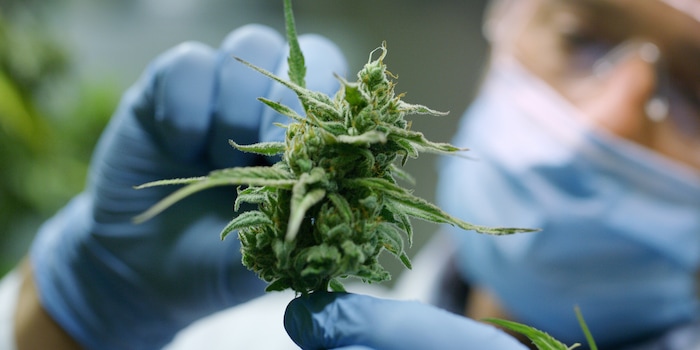
Background information
Cranberry, bladder tea, vitamins: What helps with cystitis?
by Olivia Leimpeters-Leth

Whether pain, sleep disorders or epilepsy - people want to treat numerous complaints with hemp. But cannabis on prescription is only considered as a last option. For good reasons.
Hemp can not only intoxicate, it can also help the sick. As early as 2700 BC, people in what is now China used the flowers of the cannabis plant as a remedy, for example against rheumatism or malaria. At the turn of the 19th and 20th centuries, the plant enjoyed great popularity in Europe, among other things for treating pain. For some years now, interest in it as a medicine has been growing significantly again.
Chronic pain, spasticity in multiple sclerosis or rheumatic complaints - all of these can be alleviated with the help of hemp. Likewise, components of the plant can help people with epilepsy or loss of appetite, for example cancer patients after chemotherapy or people with HIV. While people in Germany are currently discussing legalising cannabis as a stimulant, politicians, researchers and doctors are still debating to what extent marijuana is suitable as a medicine.
Proponents say cannabis as medicine has provided safe and effective therapy for people with intractable problems. Critics argue that the benefits are overstated, and that risks and harms are ignored. Well: both sides have valid points.
How good, then, that there is a growing body of research on therapeutic options that provides guidance and lays out what is and is not known about medicinal weed. One basic finding of this research: weed cannot cure, but at most alleviate symptoms of a condition.
The hemp plant contains more than 500 different compounds, over 100 of which are cannabinoids. Of medical interest is delta-9-tetrahydrocannabinol (THC), especially for people with pain. The other is cannabidiol (CBD), which, unlike THC, is not intoxicating. It is described in several studies as helpful for anxiety and sleep disorders, as well as childhood epilepsy.
Since 2017 doctors in Germany have been allowed to officially issue prescriptions for dried cannabis flowers and their extracts as well as medicines with the active ingredients dronabinol (semi-synthetic THC) and nabilone (synthetic THC) to seriously ill people - despite the lack of a marketing authorisation. As a rule, the costs are covered by the health insurance funds. Before this change in the law, this was only possible with an exemption from the Federal Institute for Drugs and Medical Devices (BfArM). Patients usually had to pay the costs themselves. Now access is much easier. Cannabis on prescription, however, is only considered if common treatments do not help or are not tolerated.
Evidence shows that cannabis is not a drug of choice.
Evidence for the efficacy of medical cannabis based on randomised clinical trials has developed little since 2017, said anaesthetist Frank Petzke at an online press conference for the German Pain Congress 2021. "There is no reliable proof of efficacy for almost all indications, especially for cannabis flowers and extracts," explained the head of pain medicine from the University Medical Centre Göttingen.
Only three drugs are approved as medicinal products: The drug Nabiximols consists of equal parts of THC and CBD. The latter cancels out some of the undesirable psychological side effects of THC. It is used as an antispasmodic mouth spray for multiple sclerosis under the name Sativex. Nabilone helps against chemotherapy-induced nausea and vomiting in capsule form under the trade name Canemes. Epidyolex has been on the market since 2019 and contains CBD. It is approved for use in patients with very rare epilepsies called Lennox-Gastaut and Dravet syndromes.
Whoever wants to be prescribed medical cannabis for chronic pain should therefore be aware of one thing: It is an individual healing experiment for which there is no clinically clearly proven proof of efficacy so far.
To gain more insights here, doctors prescribing cannabis medicines have had to report anonymised data since 2017: About the respective disease, the dosage, the effect and the side effects. The BfArM recently published the final report on the companion survey. It includes data from a total of 21 000 treatments with cannabis products and is intended to serve as a basis for deciding whether health insurance funds will cover the costs of further cannabis therapies in the future. According to the report, hemp was prescribed most frequently as a remedy for chronic pain, followed by spasticity and anorexia.
Hemp has only been shown to be effective against pain in one case: neuropathic pain, chronic nerve pain caused, for example, by diabetes, stroke or spinal cord injury. It is different from pain signals that are conducted from damaged tissue - for example, due to a cut - via healthy nerves. For many other types of pain, such as acute or cancer-related pain, cannabinoids seem to do little good.
The Cochrane Collaboration, an international network of researchers known for its systematic reviews, resumed in 2018: There is evidence that cannabis relieves neuropathic pain better and improves sleep quality more than a placebo. However, there is a lack of good quality scientific evidence to make a firm statement. In addition, side effects may cancel out the positive effects of cannabinoids. The use of cannabinoids is also not recommended in a current guideline of the Association of the Scientific Medical Societies in Germany (AWMF) on the therapy of neuropathic pain.
When cannabinoids enter the human body, they dock onto the receptors of the endocannabinoid system. CB1-type receptors are mainly found on nerve cells in the brain, CB2 receptors mainly on cells of the immune system and in the digestive tract. They are also found in the skin, bones and lungs. The best-known cannabinoids are delta-9-tetrahydrocannabinol (THC) and cannabidiol (CBD). The intoxicating effect of the drug is based on the former. In the brain, THC binds preferentially to CB1 receptors, which are present in large numbers in the limbic system, among other places, i.e. in brain regions that are involved in the processing of emotions. In addition, THC and CBD influence the release of neurotransmitters such as serotonin, noradrenaline and glutamate, which are involved in feelings of stress and anxiety.
Nevertheless, THC and CBD could be used as a stimulant.
Nevertheless, cannabinoids could be helpful, for example because they make pain more bearable. This, in turn, makes for less stress and better sleep, which makes everyday life much more liveable. Evidence for this was recently provided by a study by cannabis researcher Joshua Aviram and his colleagues at the Technion-Israel Institute of Technology in Haifa, Israel. The group surveyed more than 1,000 chronic pain patients monthly for six months in 2021 about how they were feeling. During this period, the participants took medicinal hemp in the form of marijuana or as an extract in addition to conventional painkillers. Although this did not lead to a reduction in pain intensity, two other effects occurred with increasing amounts of THC: The subjective quality of life increased and the patients needed fewer painkillers.
This impression is also confirmed by the results of the study.
This impression is also confirmed by anaesthetist Marc Seibolt: "For chronic pain patients who cannot be helped in any other way, cannabis is a blessing in many cases". Seibolt is head physician of the day clinic of the Algesiologikum, Centre for Pain Medicine and Mental Health, in Munich. In the outpatient clinic there, he says, he has cared for hundreds of people who were given dronabilone for their pain. "The patients sleep better because of the THC, it lifts their mood and counteracts depression. As a result, the pain is less present for them, they can bear it better," says the specialist, who works as a consulting expert for several pharmaceutical companies that manufacture or distribute cannabis products - including Sanity Group and the company Demecan.
.
"Patients sleep better because of the THC, it lifts their mood and counteracts depression."
The fact is: the signalling pathways that cannabinoids affect are involved in a variety of cognitive and emotional processes (see "How do cannabinoids work?"). In depression, changes in the density of cannabinoid receptors are found in different areas of the brain. It is therefore plausible in principle that cannabis consumption can influence these processes and thus alleviate symptoms. In depressed women, for example, a reduced level of endocannabinoids was found. The lower their concentration in the brain, the longer the low mood lasted, as cell biologist Matthew Hill showed in 2008. In addition, a high number of CB1 receptors in the frontal-limbic area in the brain suggests that cannabinoids might preferentially influence the affective quality of pain, i.e. its evaluation.
Psychologist Nicola Black and her colleagues at the University of New South Wales in Sydney published a meta-analysis of 84 studies on the use of pharmaceutical cannabis for mental illness in 2019. According to the authors, there is vague evidence of an anxiety-relieving effect of THC. However, the rule here is: The dose makes the poison. Small amounts of the psychoactive cannabinoid presumably have a calming effect, large amounts, on the other hand, can even cause anxiety and panic.
Self-medication with cannabis is strongly discouraged. Since legalisation for medical use or as a stimulant in various countries around the world, professional cultivation has increased. But in Europe, many products are circulating that are laced with dangerous synthetic cannabinoids. The risk of addiction is greater; panic attacks, dizziness, heart palpitations, psychoses are possible consequences of intoxication. Those who want to alleviate their pain or other complaints with cannabis should therefore definitely resort to hemp on prescription and have themselves accompanied by a doctor.
Research indicates that people with an increased risk of psychosis should keep their hands off cannabis. The drug can trigger a psychotic episode; this is probably caused by the active substance THC. Patients with heart disease and pregnant women are also advised not to use cannabis. There are also early indications that THC may inhibit the proliferation of cells of the immune system, possibly interfering with immunotherapy in cancer patients. All these factors should be kept in mind when considering the use of therapeutic cannabis
.
For those patients who still want to try medicinal cannabis, Marc Seibolt advises: Those who have never been treated with cannabis before should start with a mono preparation such as dronabinol or an extract of THC and CBD. Unlike flowers, these do not fluctuate in composition and potency, so they are easier to control. "You should also definitely start with a low dosage and then slowly increase it," adds the anaesthesiologist specialist. With orally taken capsules and oils, the concentration in the blood also increases gradually and in significantly lower amounts; in contrast to cannabis flowers, there are no psychoactive effects. This also reduces the risk of psychological dependence.
The Federal Medical Association as well as the Association of Statutory Health Insurance Physicians also advise against smoking medical marijuana, the dried cannabis flowers. Professor Stefan Andreas agrees. The pneumologist is head physician at the Immenhausen Lung Specialist Clinic of the Pneumology Teaching Hospital of the Göttingen University Medical Centre and a member of the German Society for Pneumology and Respiratory Medicine (DGP). "Inhaling cannabis can damage the lungs and the cardiovascular system," he says, adding that pulmonary hyperinflation can occur; more recently, he says, it has also been known that a diffusion disorder is possible when hemp is smoked over a longer period of time. The respiratory system then no longer brings sufficient oxygen from the air into the blood. This was the conclusion reached by Robert Hancox of the University of Otago, New Zealand, and his colleagues in 2022 in a large-scale cohort study. The researchers had repeatedly examined more than 1037 young cannabis smokers for more than 20 years for their lung function.
"Inhaling cannabis can damage the lungs and cardiovascular system"
Stefan Andreas also advises against vaping, i.e. vaporising the dried cannabis flowers, which is often recommended as safer. "There are no long-term studies that clearly prove that the e-cigarette is less harmful than the classic joint."
This is also a problem in view of the planned legalisation for consumption purposes: "What we absolutely need in advance is reliable study data on the harmful effects of cannabis."
In the final report of the BfArm it says at the end: "It is not without concern that we see the results on cannabis flowers. The comparatively low age, the high proportion of men, the high dose related to THC and at the same time the lack of findings from scientific publications on efficacy and safety at such doses raises the question of differentiation between actual therapeutic effects and experienced increase in well-being with a high risk of dependence."
The BfArm is not without concern.
The Federal Joint Committee (G-BA) is now evaluating the results of the BfArM study to determine when a therapy with cannabis makes sense. Regulations for the outpatient treatment of patients with cannabis are expected to be announced by the end of September 2022.
We are partners of Spektrum der Wissenschaft and want to make sound information more accessible to you. Follow Spektrum der Wissenschaft if you like the articles
.
Original article on Spektrum.de
Cover image: Shutterstock
Experts from science and research report on the latest findings in their fields – competent, authentic and comprehensible.
Interesting facts about products, behind-the-scenes looks at manufacturers and deep-dives on interesting people.
Show all
Background information
by Olivia Leimpeters-Leth

Background information
by Janina Lebiszczak

Background information
by Olivia Leimpeters-Leth